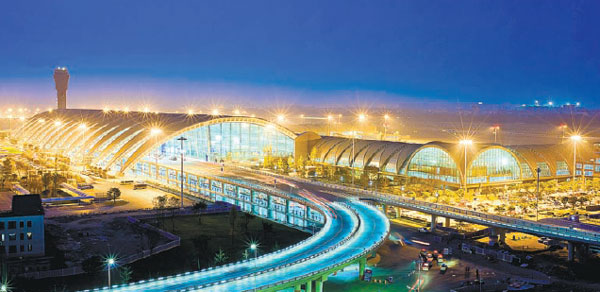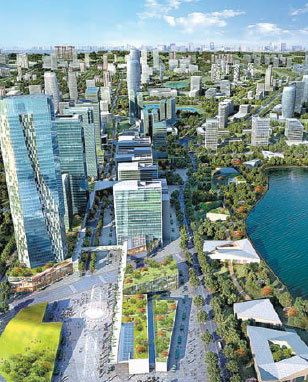City gains edge by focusing on further opening up
Chengdu, the ancient gateway to the southern Silk Road that reached the Middle East, has long been an open and prosperous city. The city still focuses on further opening up by improving facilities and sharpening its competitive edge as an innovation hub to attract investment.
As China promotes the Belt and Road Initiative, Chengdu, which is located at the intersection of the Silk Road Economic Belt and the Yangtze River Economic Belt, has grabbed much global attention. However, it is seldom reported that the city is also the starting point of the southern Silk Road, part of the ancient Silk Road that stretched from southwestern China, branching out into Myanmar, Thailand and India before taking traders all the way to the Middle East.
Historians say this trade route, hidden among the hills and winding roads in the country's southwest, used to be the main connection between Chengdu and neighboring nations. Silk, textiles and iron products from Chengdu were exported to what are now called Afghanistan and Myanmar; and ivory, seashells and colored glaze products were brought into Chengdu, according to historians. The silk products from Chengdu, known as Shu brocade, constituted the bulk of exports to foreign countries during the Western Han Dynasty (206 BC-AD 24).
Lin Ling, a renowned economist and former deputy director of the Sichuan Academy of Social Sciences, said the economy of Chengdu has long been very open and the city has always been active in economic and cultural exchanges with neighboring countries.
"The cultural and spiritual DNA of Chengdu, I think, lies in its innovation, its tolerance and its eagerness to open up and interact with the world," Lin said.
The modern Chengdu appeals to international investors with its booming innovation, high-tech industries and well-developed facilities.
Two of Chengdu's economic powerhouses, the High-tech Industrial Development Zone and the Tianfu New Area, have lined up a range of significant projects this year.
Tianfu New Area was founded in 2010 and covers the province's three cities, seven counties and 37 townships, including Chengdu, Meishan and Ziyang. The section in Chengdu accounts for 82 percent of the whole area, which was approved as a State-level new area in 2014. Since then, it has been backed up with national strategies at the top of the nation's agenda.
According to the economy and development bureau of Chengdu Tianfu New Area, the biggest advantage of the area is its integrated development of high-end industries. The area focuses on advanced manufacturing, modern services and agriculture.
On May 13, eight large project deals from companies around the world were signed in Chengdu High-tech Industrial Development Zone, worth a total of more than 4.5 billion yuan ($706 million).
Among the eight projects, three with investment of more than 3.8 billion yuan each will be in the zone's Singapore-Sichuan High-tech Innovation Park. The park is the only industrial and innovation park in western China, making it important in promoting cooperation between Singapore and inland regions of China. The park is also a potential candidate for an expected third State-level cooperation project between China and Singapore.
Data shows that by the end of 2025, the high-tech zone's total value output is expected to reach 1.5 trillion yuan and it is forecast to be home to 20,000 technology enterprises.
Chengdu is building a new airport, which will become the fourth State-level international aviation hub. The new airport is scheduled to go into operation in 2020.
With achievements in industrial development and facility construction, the city has attracted 268 Fortune 500 companies and is home to 14 consulates, according to official data.
According to a report by the independent United States think-tank Milken Institute released on Sept 14, Chengdu has topped a national list of best-performing cities in economy, ranking ahead Shanghai in second place.
fuchao@chinadaily.com.cn
|
|
|
The Singapore-Sichuan High-tech Innovation Park, which is under construction, is bidding for the third State-level cooperation project between China and Singapore. |
















